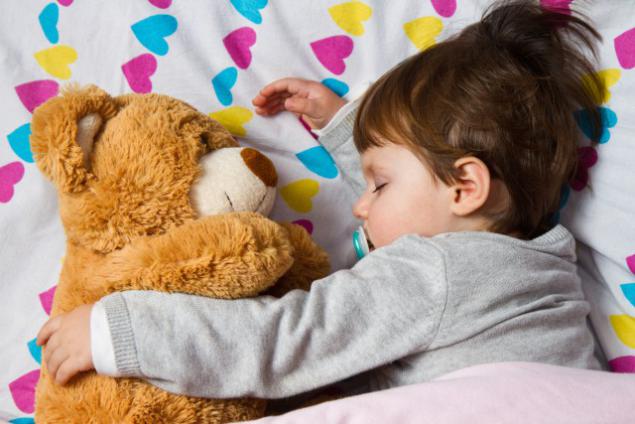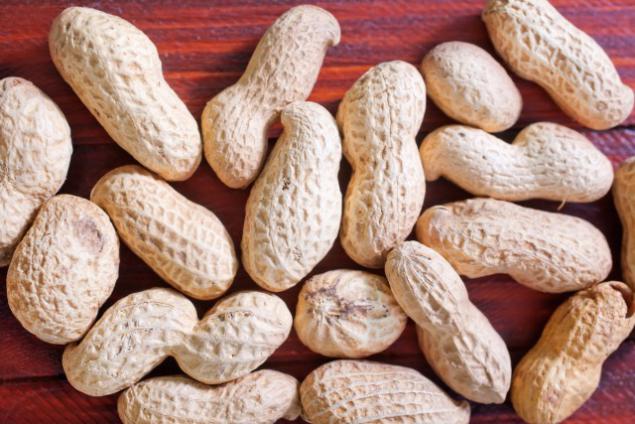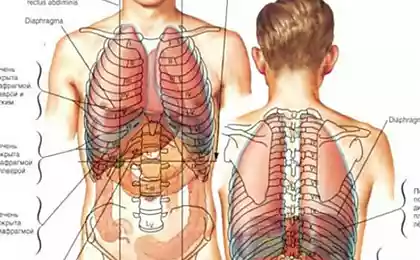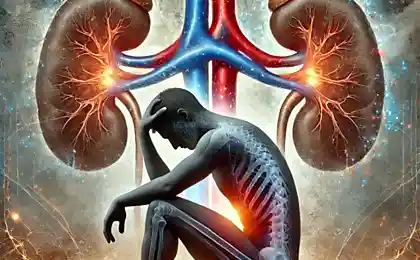878
6 small health problems that can lead to serious consequences
Find out what you will get sick in starostiEsli you suffer from hypochondria, science gives you ample opportunity to believe that almost every small daily malaise - a possible symptom horrific disease. But in reality, our bodies - is an intricate system of in which cause and effect may be the most unexpected.

1. Your reaction to a particular optical illusion may indicate shizofreniyuIllyuziya 'hollow mask "- a masterpiece of optical wizardry, deceptive forcing your brain to think that the interior of the rotating mask is the same as the outer - face with protruding elements. Check it out.
It's amazing, is not it? It looks like a normal person, and then it turns out that it was only the inside of the mask. Wait, you're saying that this is not for a moment misled you? Well ... we do not want to alarm you, but ...
Staff at the Hanover Medical School in Germany and the British Institute of cognitive neuroscience have found that there is a very specific subgroup of people who absolutely do not give the illusion of 'hollow mask "- schizophrenics.
So, stop!
Research has shown that most of us can not win deception masks, we give the illusion of over 99 percent of the time. People with schizophrenia from among the volunteers were deceived only about six percent of the time. Thus, even though schizophrenia and terrible illness, suffering its people can at least boast of a rare supernormal.
Why is that? At certain angles mask deceive an ordinary person, because the brain can not collect enough visual cues to determine what mask is concave. Therefore, in order to understand this, the brain makes you see what he thinks is right. As the rotation of the mask bizarre play of light on the edges again "explode" your brain, destroying the illusion. But of course it does not hurt you again and again fall into the same trap.
Schizophrenics can not fully comprehend the incoming sensory information. Their brain skips the intermediate step and makes no effort to correct a strange kind of mask - a hell of a blank face strangely enough for their brains.
2. Snoring in childhood can make you a failure in adult pathological zhizniVy snoring as a child? Do you have a child who snores? You are in principle against all children and snoring? Ironically, if you answered "yes" to the last question, it is likely that you are a balanced person than snorers in the first two, because the snoring children in the future have an increased chance of making mistakes.
So, stop!
Children who snored, in the three and a half times more likely to become terribly naughty and disobedient than their breathing through the nose peers h4> Let's talk a little-known "problem behavior in children based on their general etiquette Sleep. " The three-year study of 249 pairs of "baby-mama" has shown that the problem is very real. Scientists have found that children who snore during the formative years (ages 2-3 years), tend to show "holy trinity" terrible behavior: inattention, hyperactivity and aggression. As a result, children who snored, three and a half times more likely to become terribly naughty and disobedient than their peers breathing through the nose.
For those who have trouble chewing, is likely there will be symptoms of dementia than those who did not experience the problems h4> For those who have trouble chewing, most likely symptoms appear dementia than those who did not experience problems. Research suggests that those who have asked Apple why their children do not call them, were disqualified before the start of the study due to an existing disease.

1. Your reaction to a particular optical illusion may indicate shizofreniyuIllyuziya 'hollow mask "- a masterpiece of optical wizardry, deceptive forcing your brain to think that the interior of the rotating mask is the same as the outer - face with protruding elements. Check it out.
It's amazing, is not it? It looks like a normal person, and then it turns out that it was only the inside of the mask. Wait, you're saying that this is not for a moment misled you? Well ... we do not want to alarm you, but ...
Staff at the Hanover Medical School in Germany and the British Institute of cognitive neuroscience have found that there is a very specific subgroup of people who absolutely do not give the illusion of 'hollow mask "- schizophrenics.
So, stop!
Research has shown that most of us can not win deception masks, we give the illusion of over 99 percent of the time. People with schizophrenia from among the volunteers were deceived only about six percent of the time. Thus, even though schizophrenia and terrible illness, suffering its people can at least boast of a rare supernormal.
Why is that? At certain angles mask deceive an ordinary person, because the brain can not collect enough visual cues to determine what mask is concave. Therefore, in order to understand this, the brain makes you see what he thinks is right. As the rotation of the mask bizarre play of light on the edges again "explode" your brain, destroying the illusion. But of course it does not hurt you again and again fall into the same trap.
Schizophrenics can not fully comprehend the incoming sensory information. Their brain skips the intermediate step and makes no effort to correct a strange kind of mask - a hell of a blank face strangely enough for their brains.
2. Snoring in childhood can make you a failure in adult pathological zhizniVy snoring as a child? Do you have a child who snores? You are in principle against all children and snoring? Ironically, if you answered "yes" to the last question, it is likely that you are a balanced person than snorers in the first two, because the snoring children in the future have an increased chance of making mistakes.
So, stop!
Children who snored, in the three and a half times more likely to become terribly naughty and disobedient than their breathing through the nose peers h4> Let's talk a little-known "problem behavior in children based on their general etiquette Sleep. " The three-year study of 249 pairs of "baby-mama" has shown that the problem is very real. Scientists have found that children who snore during the formative years (ages 2-3 years), tend to show "holy trinity" terrible behavior: inattention, hyperactivity and aggression. As a result, children who snored, three and a half times more likely to become terribly naughty and disobedient than their peers breathing through the nose.

Another study on sleep apnea (sudden cessation of breathing) in children found the same trend. During six years of experiments were examined 11,000 children 5000 "normal" and 6000 - suffering from various sleep apnea.
Children with impaired breathing during sleep were 40% more likely to develop behavioral problems at age seven. We say this not because they once fell asleep in class and everyone knew that they snore. Their symptoms were "anxiety and depression, problems in relationships with peers, behavior problems, such as the observance of rules and social behavior towards others».
Fortunately, science may have found a solution to the difficult behavior of snoring children. We're talking about breastfeeding - in particular, how long it should be done. Studies show that a relatively late weaning is a strong predictor of children's snoring, since none of the children who were breastfed for more than 12 months, there was no snoring. Those who had been breast-fed less, if ever, nearly 25 percent more likely to develop chronic snoring.
And once we started talking about this ...
3. Restless sleep can predict ill illness ParkinsonaVam you ever had dreams in which we have attacked or persecuted? It turns out that it's not just the emotion of a busy day - it can actually predict the future Parkinson's disease.
So, stop!
Anxiety disorders can be a sign of REM sleep, caused by falling levels of dopamine in the substantia nigra of the brain responsible for motor coordination (for example, how your hand moves to his mouth, while your eyes look on the TV screen). Without the action of dopamine in REM sleep your limbs can move freely and randomly.
People suffering from this condition are more likely to develop Parkinson's disease than fast asleep. How much more? The study showed - up to 45 percent.
In another study, researchers for eight years was observed for the 21 people in violation of REM sleep. In 10 of them discovered an irregular level of dopamine in seven were neurodegenerative diseases.
That's a pretty serious problem. Fortunately, there is a silver lining: now the researchers can monitor the activity of dopamine and REM sleep in real time with the help of neuroimaging technique called "emission computed tomography single photon» (SPECT).
SPECT is quickly becoming supervazhnye tool for the detection of Parkinson's disease at the earliest stage because his "spy" capabilities can detect disease before the onset of symptoms. This gives us a chance to create a completely new generation of neuroprotective drugs in the future.
Speaking of strange tests that we will soon be able to go ...
4. Decreased sweating increases the risk of suicide (if you are depressed) Be honest: you sweat when nervous? This is one of the curses of a sense of social awkwardness - and so you feel uncomfortable on a date (or at a party, a wedding, or even during a routine trip to the grocery store ...) and now you are doubly uncomfortable because of your wet underarms.

We have good news for you: you are in a group of people less than others prone to suicidal thoughts.
So, stop!
Simply put, one of the signs of the transition from a "bad mood" to "so depressed that I want to die," is that the reflexive responses produced by your body, blunted. The answer to the involuntary fear - pot. The study involved 800 people who had been treated for depression. They are connected to sweat detectors, and then subjected to a series of stress sudden loud noises.
All the people responded to the noise, but prone to depression and suicidal thoughts subjects quickly became biologically indifferent and later showed a blunted reaction.
Incredibly, reduced sweating was observed in 97 percent of those who later committed suicide, and only two percent of those who did not.
Obviously, our goal - not to convince you that the absence of sweat under stress - a death sentence: Some people are just a little sweat.
The findings are useful in that science can come up with a simple physical test that will help determine exactly who is at risk of suicide. If so, then the knowledge of this feature will result in an enormous advantage.
Now scientists are trying to find out through a series of questionnaires, and it is wrong, because no one likes to fill them and this process spoils the mood.
5. Weak bite may be a sign dementsiiVam becomes increasingly difficult to open a beer bottle cap your teeth? This may seem like a minor inconvenience, but it could be a sign that your brain will stop working soon.
So, stop!
Karolinska Institute studied 557 participants between the ages of 77 years. These sensors are connected the bite force and asked to eat apples. Sensors recorded as forces exerted every participant, biting fruit.
For those who have trouble chewing, is likely there will be symptoms of dementia than those who did not experience the problems h4> For those who have trouble chewing, most likely symptoms appear dementia than those who did not experience problems. Research suggests that those who have asked Apple why their children do not call them, were disqualified before the start of the study due to an existing disease.
Another study in Japan for more young people between the ages of 60 years, showed about the same results. We also note that subjects with less severe dementia had significantly more teeth.
It is believed that the matter is, the chewing motion stimulates blood flow. Chewing - this is mainly for the training of the person, and if you are not able to do it properly, blood flow in the brain is reduced substantially, leaving him to die.
6. Simple tests of smell can identify Alzheimer's disease ... and psihopatovObonyanie we need not only to find the smell of a delicious donut. It affects our perception of the world. There are simple tests of smell that can instantly recognize some may present you a very specific brain states.
So, stop!
Let's start with Alzheimer's disease. Scientists from the Institute of Brain in Florida used the peanut butter to identify the disease. All you need to do - peanut butter, a ruler and a friend.
To start the test, close your eyes, mouth and one nostril. Make it so that your friend was holding peanut butter at the chest, and then slowly raise it up until you feel the slightest smell, and then measure the distance between the nose and peanuts. Repeat for the other nostril.
If the distance is less than 10 centimeters, and the left nostril is weaker, you have a higher chance of occurrence of Alzheimer's disease.
A student came up with this brilliantly simple test, when I realized that the traditional tests of cognitive disorders smell overlooked that in a strange way, as the downward spiral of cognitive decline begins in the first cranial nerve, which transmits information to the brain about the smell.
Peanut butter also has been chosen because it was cheap and has a pungent odor.

The study also shows a strong link between poor sense of smell, and psychopathy. Australian researchers were able to classify the psychopathic tendencies in relation to the olfactory abilities.
Using scented marker, the researchers conducted a series of tests to identify hidden psychopaths. 79 people aged 19-21 years were asked to find a marker that had a smell. Psychopaths in the group had trouble even when they were told how to handle suspected groin. Furthermore, they were not able to discriminate odors.
Potentially this is very important. Now, you may be a simple test that can offer an objective method of determining the disorder, which we usually try to identify with the help of a questionnaire, which is always subjective.
Of course, scientists concede that the bad smell - is not always a sign of impending psychosis. It may be caused by other diseases such as schizophrenia and Parkinson's disease. Or you just have a runny nose.
via www.cracked.com/article_22412_6-tiny-things-that-indicate-youve-got-huge-medical-problems_p2.html
Idiotic advice on productivity, which do more harm to you than help
Man creates his own country of absolute freedom and peace



























